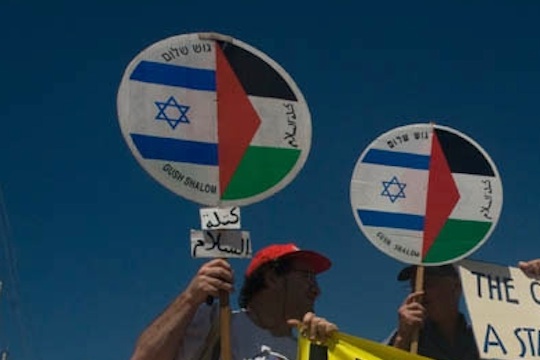Palestinians fear Israelis more than Israelis fear Palestinians, opinion survey finds. Both societies reject the one-state solution, but Israelis also oppose the Arab Peace Initiative.

According to a survey of both societies, conducted by the Harry Truman Research Institute at the Hebrew University and the Palestinian Center for Policy and Survey Research, a clear majority in Palestinian society – 57 percent – believe that Israel’s long-term desire is to expand its borders from the Mediterranean Sea to the Jordan River and expel the Palestinians. 37 percent of Israelis believe that the long-term ambition of the Palestinians is to conquer the entire land and kill a major part of the Jewish population. Seventeen percent of Israelis believe that the Palestinians’ goal is to conquer the entire land.
Only 10 percent of Israelis and 27 percent of Palestinians believe that negotiations will be renewed and violence end. Thirty-four percent of Israelis and 31 percent of Palestinians believe that negotiations can be renewed but that violence will continue. Forty-four percent of Israelis think that negotiations won’t even be renewed.
Sixty-eight percent of Israelis and 69 percent of Palestinians don’t think a Palestinian state will be established in the next five years. Most Israelis support the two state solution but a majority of 51 percent also thinks that this solution is bound to fail. Fifty-eight percent of Palestinians think that the two state solutions is irrelevant.
At the same time, there is no alternative for the two-state solution that gains substantial support. Sixty-three percent of Jews oppose a single-state solution. Even a larger number among Palestinians – 69 percent – opposes the idea. The last figure is a bit surprising, suggesting that the one-state solution’s popularity within the intellectual elite has yet to take precedence over the Palestinian desire to separate from the people who have controlled their lives for so long.
Half of Israelis are worried that they or one of their relatives might be hurt by Palestinians, as opposed to 74 percent of Palestinians who are worried that they or their relatives might be hurt by Israelis, that their land will be confiscated or their house destroyed. These figures haven’t changed since the 2012 poll.
In general, one could say that while both societies are pessimistic and feel threatened by the other, Palestinians are more pessimistic — and more threatened.
One place where Palestinians and Israelis differ is with their attitude toward the Saudi plan (also known as the Arab Peace Initiative). According to this idea, Israel would withdraw from all the areas it conquered in 1967, and an independent Palestinian State will be established; and the refugee problem will be solved in a way which both parties agree to. In return, all Arab countries will recognize Israel and establish full diplomatic relations with it. In a poll conducted two years ago, both Israelis and Palestinians had the same level of support for the idea. Today, a majority of Palestinians (56 percent) support the Arab Peace Initiative (as it was defined above) while most Israelis (67 percent) oppose it. Today, only 24 percent of Israelis support the plan. Those figures might support something I have written several times in the past – that Netanyahu is constantly moving the Israeli public to the right.
The Palestinian poll included 1270 participants from the West Bank, Gaza and East Jerusalem. The Israeli poll included 601 people.
Related
Give the Palestinians a break, Kerry, and stay home
Analysis: A recipe for diplomatic collapse

